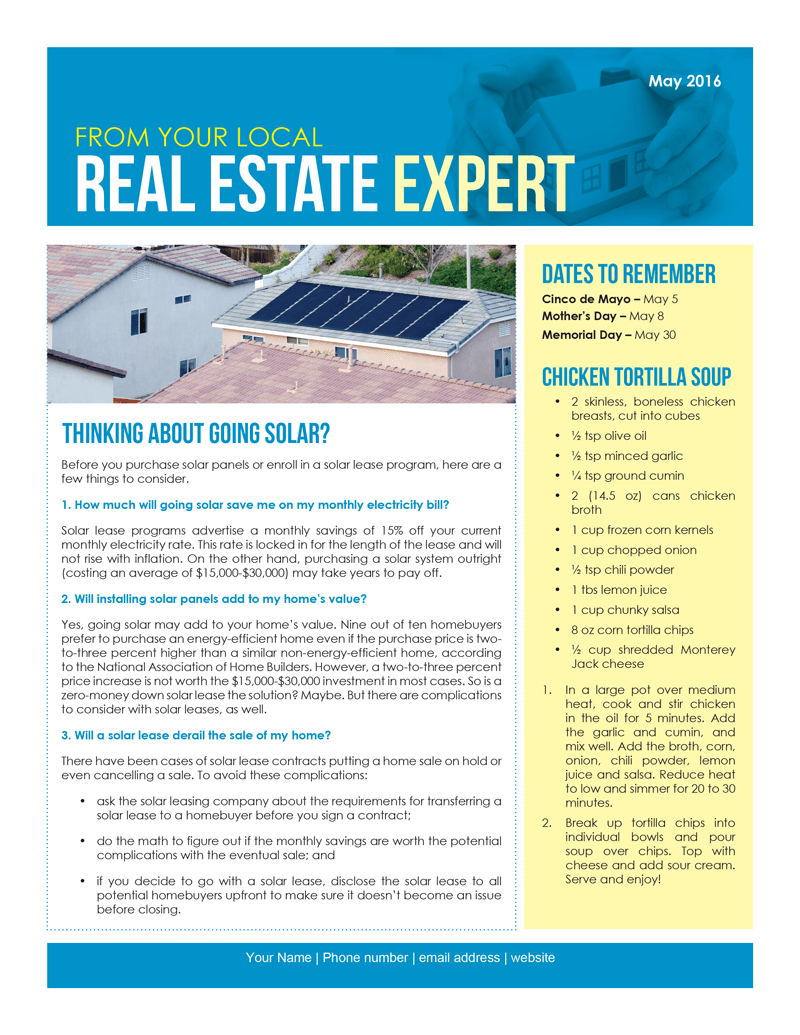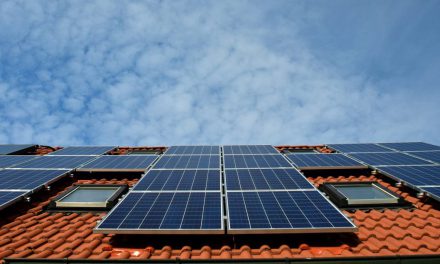Use this first tuesday FARM Letter in your marketing. To request a FARM letter topic, or to see a list of all our FARM letter templates, visit our FARM Letter page.
Download the Personalization Instructions Download the PDF Template Download the Microsoft Word TemplateText only
Dates to remember
Cinco de Mayo – May 5
Mother’s Day – May 8
Memorial Day – May 30
Chicken tortilla soup
- 2 skinless, boneless chicken breasts, cut into cubes
- ½ tsp olive oil
- ½ tsp minced garlic
- ¼ tsp ground cumin
- 2 (14.5 oz) cans chicken broth
- 1 cup frozen corn kernels
- 1 cup chopped onion
- ½ tsp chili powder
- 1 tbs lemon juice
- 1 cup chunky salsa
- 8 oz corn tortilla chips
- ½ cup shredded Monterey Jack cheese
- In a large pot over medium heat, cook and stir chicken in the oil for 5 minutes. Add the garlic and cumin, and mix well. Add the broth, corn, onion, chili powder, lemon juice and salsa. Reduce heat to low and simmer for 20 to 30 minutes.
- Break up tortilla chips into individual bowls and pour soup over chips. Top with cheese and add sour cream. Serve and enjoy!
Thinking about going solar?
Before you purchase solar panels or enroll in a solar lease program, here are a few things to consider.
- How much will going solar save me on my monthly electricity bill?
Solar lease programs advertise a monthly savings of 15% off your current monthly electricity rate. This rate is locked in for the length of the lease and will not rise with inflation. On the other hand, purchasing a solar system outright (costing an average of $15,000-$30,000) may take years to pay off.
- Will installing solar panels add to my home’s value?
Yes, going solar may add to your home’s value. Nine out of ten homebuyers prefer to purchase an energy-efficient home even if the purchase price is two-to-three percent higher than a similar non-energy-efficient home, according to the National Association of Home Builders. However, a two-to-three percent price increase is not worth the $15,000-$30,000 investment in most cases. So is a zero-money down solar lease the solution? Maybe. But there are complications to consider with solar leases, as well.
- Will a solar lease derail the sale of my home?
There have been cases of solar lease contracts putting a home sale on hold or even cancelling a sale. To avoid these complications:
- ask the solar leasing company about the requirements for transferring a solar lease to a homebuyer before you sign a contract;
- do the math to figure out if the monthly savings are worth the potential complications with the eventual sale; and
- if you decide to go with a solar lease, disclose the solar lease to all potential homebuyers upfront to make sure it doesn’t become an issue before closing.
Stay cool and save money
California summers aren’t all beaches and palm trees. Here are some ways to keep your home cool during summer without using expensive air conditioning:
- Close and cover your windows. Use drapes, blinds or curtains to block sunlight. Keep your windows sealed during the day to keep in cool air.
- Adjust fans to turn counter-clockwise. This movement sucks hot air up and cools your skin. Fans don’t create cool air, though, so turn them off when you leave the room.
- Disconnect any idle technology. Appliances and electronics produce heat, even if you aren’t using them. Unplug them.
- Switch to energy-efficient lightbulbs. Incandescent lightbulbs produce more heat than light. Switch to LED or CFL bulbs instead, and turn off lights when you aren’t in the room.
- Start cooking outside. Much everyday heat comes from cooking. Avoid using your oven and stove by grilling outside. Eat more raw or cold dishes, like sushi or salad.
- Prime your bed for cool evenings. Switch to 100% cotton bedding and remove bed risers to avoid rising heat through the night.
- Make permanent changes to keep your home summer-ready. Plant trees in your yard to block sunlight. Install awnings over windows. Ensure your attic is properly insulated and have any air leaks sealed.
Stay cool! If you or anyone you know are looking to buy or sell, please give me a call!
Maintenance Tip!
Maintaining a healthy lawn requires plenty of water and fertilizer, but you don’t have to empty your wallet to keep your lawn green. Cut your costs by:
- watering your lawn only one to two inches per week;
- keeping mower blades sharp and clean to trim grass for maximum moisture retention;
- mowing your lawn to no lower than two or three inches to reduce root exposure and water evaporation; and
- investing in a self-mulching lawn mower to allow the cuttings to fertilize the lawn.
A vibrant yard doesn’t always mean having a lawn, either. Consider replacing your grass with cost-effective alternatives, such as:
- drought-resistant plants;
- seeds or young plants, which are cheaper than buying full-grown plants;
- trees and plants native to your area to eliminate the need for extraneous watering; and
- fruit trees or a vegetable garden.















